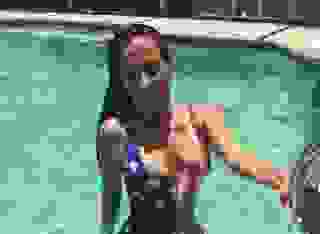- Sci-Fi & Fantasy
- The GOD-father
Note: You can change font size, font face, and turn on dark mode by clicking the "A" icon tab in the Story Info Box.
You can temporarily switch back to a Classic Literotica® experience during our ongoing public Beta testing. Please consider leaving feedback on issues you experience or suggest improvements.
Click hereAuthor's note.
This was the first short story I ever wrote. There is no sex in this one, but I hope you enjoy it just the same.
Talemaster
*
Frank lit another cigarette as he looked at his equations. Oblivious of the splendid Australian autumn afternoon and the traffic around him he contemplated his calculations. They seemed right. Omniscan would be pleased. Anyone looking at Frank in his faded jeans, the tee-shirt and thongs, sitting in a pavement cafe in Sydney's Kings Cross, sipping mineral water and smoking incessantly, would have never guessed that Frank was the wealthiest and most powerful man on earth. The fact that he was did not bother Frank; he didn't know!
He was in his early sixties, balding, bespectacled and still a virgin. Frank was a genius. He was also a nut!
He scanned his equations once more and, satisfied with his work, closed the folder. Frank waved impatiently to the waitress, paid his bill and hurriedly crossed the street. He lived in a charming art deco building not more than fifty yards away in Macleay Street. The building stemmed from the 1930s and had been tastefully and meticulously restored to its former splendour. Frank had chosen the building carefully, not for its old world charm, but for the people that lived there. The occupants of the sixty or so units in the building were mostly retired and comparatively well off; the units were not cheap. Life was sedate, the problems confined to the weather, the occasional illness or death, and the cost of living. Visitors seldom called, there were no loud parties and above all, there was little curiosity about neighbours. This suited Frank. In the beginning he let it be known that he was a technical writer who wrote books about computers at home. He even showed some books around that had his name on the cover. No-one wondered after that why Frank was always home, or why computer equipment was moved in and out of his unit from time to time. They even let him install a satellite dish on the roof that he said he needed for his work. He was well liked in the building, for though a quiet and withdrawn man, who kept to himself, he had a charming manner about him and never talked ill about anyone.
Frank took the lift to the second floor and unlocked the door to his apartment. He entered the tiny hall, not much larger than a shower recess, and closed the door behind him carefully. As soon as the lock clicked shut the heavy steel inner door slid noiselessly open to reveal a large L-shaped room. It was like stepping into another world.
The room looked like the command centre of the USS. Enterprise in the popular science fiction series Star Trek. Electronic equipment was mounted along the walls from floor to ceiling, monitors displaying all sorts of data were stacked one above the other, a large console was mounted on a revolving platform in the middle of the room, and could be moved to face in any direction at the touch of a button. There were no windows. A large screen on the far wall, reaching from ceiling to floor, sprung into life as Frank sat behind the console. It showed the inside of a luxurious library, with a man sitting behind an exquisitely carved antique desk.
"Good afternoon," the man said. "Do you have the equations?"
The man looked and sounded remarkably like Richard Burton. It was no coincidence. Frank had designed it that way.
"Good afternoon Omniscan," Frank replied. "Yes, they are ready."
He fed the papers into the scanner on his console.
"That is good Frank," said Richard Burton. "You have done it this time. This is all I need. You will have your answer in forty eight hours and seventeen minutes."
Frank's heart skipped a beat. He had not expected this. After all these years he would finally KNOW! The question that had plagued him all his life, that had dominated everything, his work, his dreams, his very soul, would finally be answered. Silently he watched as the picture faded. Soft lights cut in as the screen went blank, making the austere room look rather cosy.
"Invitation to the dance," Frank said, leaning back in the heavy leather chair that was part of the console.
As the soft strains of Weber's music filled the room Frank closed his eyes and thought about his life. It seemed a fitting moment.
* * *
He remembered when he first heard about God. He was a small child then, listening wide eyed to the stories of the bible like most children of his generation. Unlike other children, he questioned what he was told almost right from the beginning. His genius was already asserting itself. He could clearly see the discrepancies between the teachings and observable reality, even at this early age. As he grew older he found to his amazement that there were many different versions of God, each with His own teachings, each the only and true God to His followers and each one asking His followers to believe in Him, for there was no proof of His existence. It was deemed virtuous not to question the teachings. It struck him as odd that believers followed with fervour and single-mindedness such a tenuous notion, to the point of killing each other over some esoteric interpretation or fundamental difference of opinion.
'People', Frank reasoned, 'don't know anything about God! They do not even know for certain if He exists.' Here was something worthwhile to do! Frank decided he would become the man who would prove to the world the existence or non-existence of God. He was only ten when he made the decision. It was to shape his life.
Frank gravitated naturally to computers. When he first heard about them he sensed that these machines could become a powerful extension to his mind that would help him in his quest. Computers had just become affordable and he was one of the first teenagers in town to have one. It was a primitive affair, not much more than a calculator really, but it did have a cassette recorder as a storage device, and it could be programmed. It used the home television set as a monitor.
Frank found his calling. Within weeks he not only mastered the device, but redesigned and reprogrammed it, so that it could do things that the designers had not thought possible.
Nigel, Frank's mathematics teacher was a friend of the family. He was also the boy's godfather. He loved the boy and spent much of his spare time teaching him mathematics and physics. Frank's knowledge of these subjects was way beyond that of students ten years older. The boy was a pleasure to teach. He was eager for knowledge and a fast learner. Nigel seldom needed to repeat himself, even on difficult material. The boy's ability to understand and his phenomenal memory were a joy for any teacher. Nigel had an interest in computers himself. He watched with amazement Frank's progress. There was no doubt the boy had a natural talent. He decided to do something more for the boy.
The school had a special fund for gifted children. He put in an application on Frank's behalf and succeeded in providing the boy with private tuition.
The tutor was a university graduate who was involved in computer design and programming. It was the best man Nigel could find. The boy made excellent progress. A year later the tutor came to see Nigel. He told him that he could help Frank no further.
"The boy is a genius," he said. "He has a grasp on the subject that goes way beyond my understanding. I have difficulties following his equations, even after he explains them to me. It is almost as though he is capable of thinking like a machine. Mark my words, this boy will go far."
"What should we do with him then?" asked Nigel with some concern.
"I have an idea," said the tutor. "A friend of mine runs a computer service bureau. He needs good operators and programmers. I have told him about Frank, and he is willing to give him a try. Frank will have access to a decent machine, he can use and broaden his skills in this environment better than anywhere else."
"But the boy is not even fourteen yet!" exclaimed Nigel.
"So what? Regard it as an apprenticeship. Surely you can convince the authorities that Frank's talent is a special case that needs special consideration."
Within four weeks Frank was working as a computer operator. He was sacked six months later, after his employer discovered that Frank had made unauthorised modifications to the computer. The fact that the machine's efficiency was dramatically improved did not seem to matter.
Frank was not unemployed for long. The very next day a representative of the computer manufacturer came to see Frank's father with a contract for the boy. Frank accepted. He worked with the company for three years. His new job gave him access to installations he would have never seen otherwise, such as defence department computers, banking computers as well as those of the taxation department and scientific institutions. He learned fast. He was still obsessed with the question of God's existence.
He reasoned that the task he had set himself was beyond a human beings capacity to handle. There was not enough time in the life of man to acquire and evaluate the needed information. If he was to succeed he would need two things, access to all the information in the world and processing power, lots of it. Frank pondered the problem and suddenly he could see a way. It was so simple. His genius had done it again.
He knew that there were a number of very large machines around that had spare capacity. If he could link all these machines together in some way, and gain control of the linkup, he would in effect have the largest computer in the world at his command by just using the spare capacity of idle machines. If he was clever no-one would even know he was doing it. This would provide him with the processing power he needed to solve his question. It would cost him very little.
Computer linkups existed already. Some machines were communicating with each other via rented telephone lines. Teams were already working on communication via satellite. The technology was just around the corner and would be common place within ten years. If he could gain control of just one satellite, the rest would be easy. Frank already knew how to do this.
The company that was in the forefront of program development in that area was SatCom, a US. enterprise based in Los Angeles. They had a problem. Their most popular communications software called TeleLink had a number of bugs in it that the technicians had been unable to eliminate in the last two years. SatCom's customers were unhappy, yet kept using the program just the same. It was the best of a bad bunch.
Frank acquired a copy and single handedly rewrote the whole thing in six months. He tested it on the machine of one of his company's clients. It worked flawlessly.
Frank quit his job and went to Los Angeles. He commissioned a detective agency to investigate SatCom and its managing director Geoff Richards. After four weeks Frank decided he had enough information and made his move. He knew that Geoff was in the habit of dining every Sunday night in a little Mexican restaurant in downtown LA. with his boyfriend. Geoff's boyfriend was always at least half an hour late, a fact that caused a lot of friction between the two. Frank decided to use this half hour. He went to the restaurant early, a computer tape of his program under his arm. Geoff was on time, as usual, and ordered a drink. Frank waited until the drink arrived, then stood up, went to Geoff's table and without a word put the tape on Geoffs dinner plate.
Geoff looked up, bewildered. "What is this? Who are you?"
Frank looked him straight in the eye and said calmly: "This is a bug free version of TeleLink. I wrote it myself. As to who I am, here is my card. Test the program and if you like what you see give me a call on Friday. This should give you enough time to check it out."
"Why are you doing this? What is it that you want from me?" Geoff asked, unsure of whether he was dealing with some dangerous nut.
"I want a job with your company in program development, a senior position at that. Don't forget to give me a call." With that Frank turned around and left.
The call came on Wednesday. By Friday Frank was chief programmer/analyst at SatCom.
* * *
Six months later Frank was summonsed to the Pentagon. He was ushered into a large office where he was greeted by a tall man in the uniform of a four star general of the US. Air Force. The general did not introduce himself.
"We have a problem," the general said abruptly. "Our most sophisticated and expensive surveillance satellite so far will not give us a picture. Our finest brains have not been able to solve the problem. All they can say is that it is caused by some error in the communications program. If you can help us I am authorised to offer your company anything within reason as a fee. Will you help?"
Frank saw his opportunity. "Okay," he said. "Show me."
Two days later Frank sat in front of a console in an underground installation God knows where and looked at the surveillance screen. The picture was garbled and unrecognisable, but there. 'Good Lord,' he thought recognising immediately what was wrong. 'Do they have nothing but idiots working for the government?' He could fix the problem in minutes if he wanted to, but he did not. He had other plans.
"This will take some time," he said out aloud. "Get me some cigarettes, mineral water, a writing pad and some pencils."
Someone had been thoughtful and thorough.
"Help yourself," said the security guard, opening a cupboard and the refrigerator door. Sure enough, there were several cartons of his favourite brand of cigarettes, writing material enough to last him several months, and the fridge was stocked with the mineral water he preferred.
After helping himself to what he wanted, Frank pretended to do some involved calculations, occasionally punching some figures into the computer, then going back to his pad and doing some more. 'Let them make sense out of this,' he thought as he wrote more equations down. What he was really doing was cracking the access codes. After two hours he had them all. He added a simple access key of his own that enabled him to circumvent all controls. It would be virtually undetectable. He was entering the modifications to the communications program when the senior technician looked over his shoulder.
"How is it going?" he asked with a smirk on his face. He evidently resented the presence of some smartarse outsider in his domain.
"All fixed," said Frank with a grin as he entered the last instruction. Immediately the screen came to life, showing what was obviously a launching pad with a huge rocket marked CCCP and a red star on the nose. It was night. Technicians were working under floodlights on the rocket, they were clearly visible. There was no doubt Frank was getting the live image in real time.
The technician's jaw dropped, he yelled a command to the security men, who unceremoniously bundled Frank out of the room. Evidently he was allowed to fix the thing but not to see what it was spying on.
Two days later he was back at his desk at SatCom. The telephone rang.
"This is the general," the voice at the other end said. "Thank you for what you have done. Send us your bill, and please, don't be modest. You have helped us more than you know."
"I don't want your money," replied Frank. "I want to see you in my office tomorrow morning at ten. It is a matter of national security."
"What are you trying to pull you arrogant little idiot?" yelled the general and hung up.
Frank grinned. This would be fun! He busied himself on his computer, occasionally chuckling to himself as he typed.
Seconds later the technicians in the underground installation, and minutes later the staff at the Pentagon were in panic. The satellite that was trained on a space port in the USSR had transmitted the message: TELL YOUR GENERAL THAT THE ARROGANT LITTLE IDIOT STILL WANTS TO SEE HIM IN HIS OFFICE. The message was signed: TEN.
At nine o'clock next morning the general, in civilian clothes and flanked by four security men, burst into his office.
"Get those goons out of here!" screamed Frank.
The general waved to the security men who reluctantly left the room. Frank motioned the general to sit down and said:
"You have already found out that your security is lousy, let me show you now how bad it really is." Frank went over to his computer and punched a few keys. The large screen came to life displaying SatCom's Logo.
"I take it that your access codes have been changed since my little demonstration yesterday." The general nodded as Frank continued. "What do you think my chances are to put your precious pictures from your spy satellite on my screen right now?"
"Absolutely none!" said the general with conviction.
"Well well, what is this then?" said Frank, pushing some buttons and there it was, launching pad, rocket, technicians and all.
The general stared at the screen with his mouth open. "It's a trick," he said hoarsly. "It's nothing but a cheap trick."
"I think you need some more convincing," said Frank amiably. "I noticed that you and the senior technician at the installation called each other by some nickname, what were they again?"
"He is a friend of mine," the general replied. "We have known each other since college. I call him Buster and he calls me Lion. Its from the old football days."
Frank typed a message on his computer. The screen read: TOP PRIORITY..... BUSTER.. RING IMMEDIATELY.. L.A. 4459 6677... SIGNED.. LION.. Two minutes later the phone rang.
"I think it's for you general," Frank said.
It was. The general needed no further convincing that the security system was ineffective. He had been assured by the designers that anyone trying to break into the system and who did not have the necessary codes would need over two thousand years to crack it. The codes were changed every month. The system was considered impenetrable. Frank had only been in the computer room for two hours and the machine was already on the right channel when he arrived. There was no way to do what he did they said, but he had. They had changed the codes just to be on the safe side against a long shot. Now they stated that there was no way Frank could repeat his stunt without gaining physical access to the computer. The designers were emphatic about this. And yet, here it was. It was evident that Frank had it in his power to show them any goddamn thing he pleased as coming from the satellite. It was unthinkable. On the other hand Frank had not misused his power. He had reported his findings to the proper authority freely and without seeking an advantage for himself. The general decided that Frank could be trusted, up to a point. He was a dangerous man just the same though.
"Where do we go from here?" asked the general.
"Why not let SatCom handle the programming of the security communication systems. We are reputable enough, we do a lot of work for the government already, some as highly classified as this. We could give you a much better service than what you are getting now."
"Only under one condition."
"And what might that be?" enquired Frank.
"That you head the team!"
Frank nearly burst out laughing. 'That's how easy it is to hoodwink these arseholes' he thought. Frank said he would be pleased to design the system but would prefer if someone other than himself would head the team.
"I'm no team leader," Frank explained. "The supervisory and administrative work is not for me. I'd be wasted there anyway. You need me as a technician, not as a boss."
The general was relieved. He could manoeuvre his own people into the sensitive areas and leave this arrogant genius in the backroom where he belonged and could do no damage. Frank would be allowed to design and test things at SatCom, but would never again enter any of his installations, that much was certain. He agreed immediately to the suggestion and promised that contracts would be drawn up within two weeks. The remunerations would be generous.








